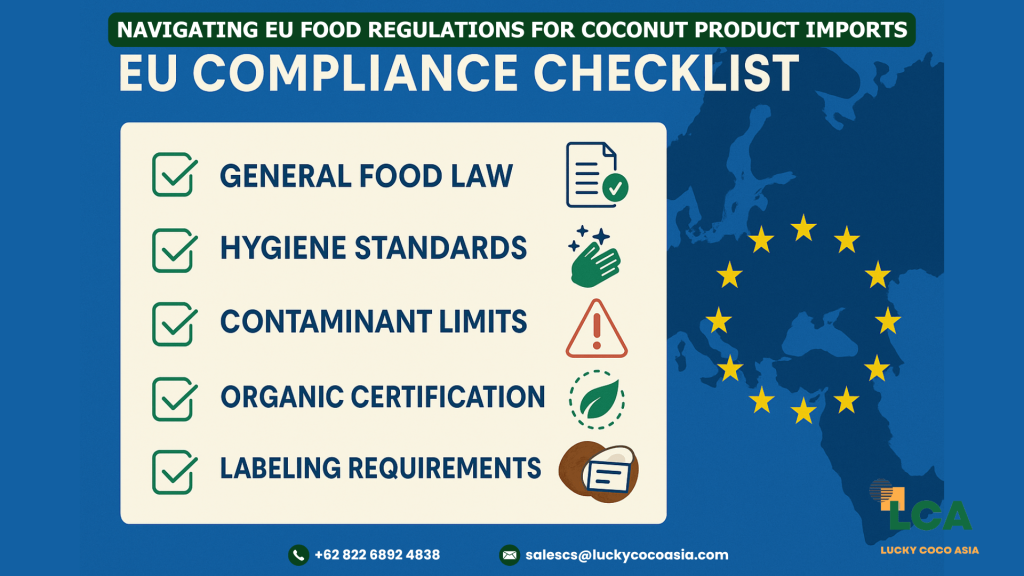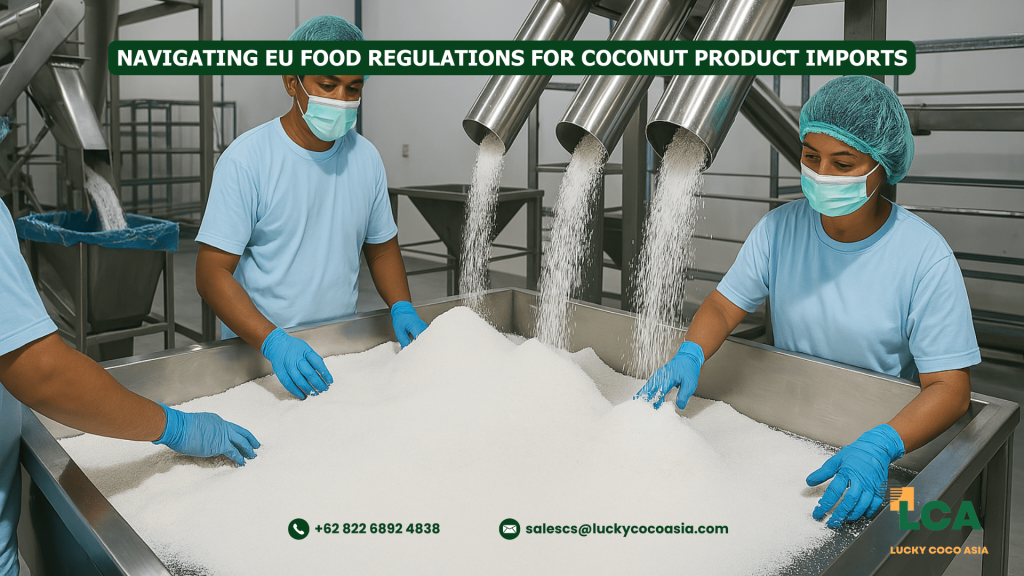EU Food Regulations – Coconut Product Import Guide

Navigating EU Food Regulations for Coconut Product Imports
Importing coconut products into the European Union can open new market opportunities. However, it also requires a solid understanding of strict food regulations. For importers and distributors across Europe, ensuring compliance isn’t optional—it’s essential.
At Lucky Coco Asia, we supply desiccated coconut, coconut sugar, coconut chips, and coconut cream from Indonesia. Moreover, we work closely with international partners to meet the highest safety and regulatory standards. This guide highlights the most important compliance steps for EU-focused importers.
1. EU Food Regulations : What You Must Know
To start, the European Union enforces some of the strictest food safety laws in the world. Whether you’re importing coconut sugar or desiccated coconut, all food items must comply with the EU General Food Law (EC No 178/2002).
This regulation ensures that:
- Products are safe and free from harmful substances.
- Food can be traced at every stage.
- Unsafe products are quickly recalled or withdrawn.

2. Certifications That Matter to EU Buyers
Certifications are more than just stamps—they are trust builders. Coconut products entering Europe must come from certified suppliers.
For instance, certifications like FSSC 22000 ensure food safety and hygiene throughout the production process. In parallel, EU Organic and USDA Organic labels confirm that the product meets global organic standards. Certain markets may also require Kosher or Halal compliance to serve diverse consumer groups. Finally, a Certificate of Origin is often needed to validate Indonesian sourcing.
Furthermore, having these certifications not only satisfies legal needs but also builds customer confidence. In turn, this helps importers build stronger relationships with retail and industrial buyers.
3. Microbiological Testing & Lab Documentation based of EU Food Regulations
Food safety begins with testing. Each batch must undergo lab analysis to detect harmful microorganisms such as Salmonella, E. coli, yeast, and mold. The lab also checks moisture content, which is crucial for maintaining shelf life. (Read also: HACCP in Desiccated Coconut Manufacturing)
Your supplier should provide a Certificate of Analysis (COA) for each batch. This document proves that the product meets safety standards and minimizes the risk of rejection at European ports. You should also store digital records for every shipment as part of your compliance system.
4. Labeling and Packaging: More Than Just a Sticker
Proper labeling remains essential for customs clearance and consumer transparency. According to Regulation (EU) No 1169/2011, labels must include product name, net weight, nutritional data, batch number, country of origin, expiration date, and allergens.
When labels meet all requirements, they not only comply with the law but also support product acceptance in European markets. Additionally, attractive packaging and clear communication can build brand credibility.
5. Ethical Sourcing and Sustainability Expectations based of EU Food Regulations
Today, EU buyers want assurance that products are responsibly sourced. They value transparency in sourcing, treatment of farmers, and sustainability practices.
At Lucky Coco Asia, we support ethical trade by working directly with Indonesian coconut farmers. We also advocate for organic farming and reduce waste by converting coconut husks into biomass energy. These practices reflect the goals of the European Green Deal.
As a result, our partners enjoy the added value of environmental and social responsibility.
6. Your Compliance Strategy for Coconut Product Imports
Before shipping your next coconut order to Europe, conduct a thorough review of your export readiness. Start by confirming that your supplier holds valid certifications. Then, verify that lab tests and COAs are prepared and aligned with EU standards. Next, inspect packaging and labels to ensure accuracy. Lastly, enhance your brand’s reputation by documenting sustainable practices.
By managing these steps proactively, you improve your chances of smooth entry and long-term success in the EU market.
7. Partnering with a Compliant Supplier: Why It Matters
Following EU regulations can be challenging, especially for new market entrants. That’s why many European buyers partner with experienced suppliers like Lucky Coco Asia.
We handle food safety, documentation, testing, and traceability under one roof. Our certified production facilities operate with strict hygiene standards. We also maintain close relationships with our farming network to ensure supply consistency.
In addition, our export team provides continuous support with paperwork and compliance updates. This way, our partners can focus on growing their business while we manage the complex regulatory side. (Read also: Desiccated Coconut Price Trends 2025)
Final Thought
Navigating EU food regulations doesn’t have to be overwhelming. When you partner with the right supplier, you simplify the process and build long-term value for your brand.
At Lucky Coco Asia, we’re ready to help you bring high-quality, certified coconut products to the European market.
Let’s work together—reach out today to get started. (Contact us here)

